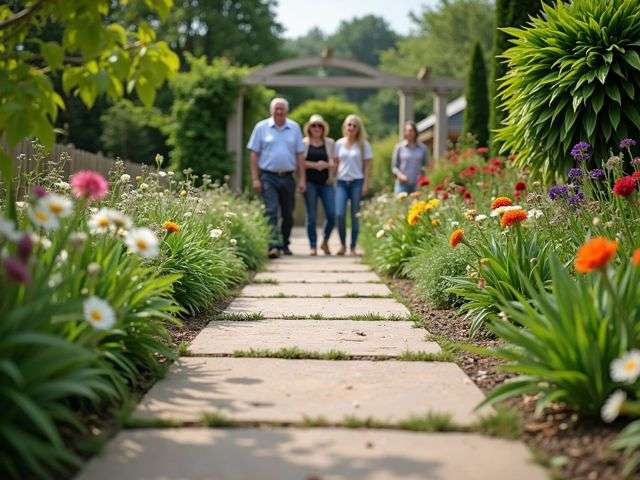
Recycled Pavers: Trendy or Risky?

Recycled pavers are both trendy and durable, offering eco-friendly benefits and cost-effectiveness without compromising on performance. However, they may pose aesthetic limitations and require careful consideration of environmental conditions.
Recycled Pavers in Glendale: A Green Choice?
Recycled pavers are becoming a popular choice among the eco-conscious in Glendale. These pavers, crafted from materials like crushed concrete and glass, offer ecological and financial benefits. Utilizing recycled materials for pavers greatly reduces landfill waste and conserves natural resources. Their production requires less energy, which offers a lower carbon footprint, benefiting builders and homeowners looking to reduce environmental impact.
In terms of durability, recycled pavers compare favorably to new counterparts. They withstand the rigors of use, providing a lasting, low-maintenance solution for outdoor spaces. Permeable pavers enhance rainwater absorption, minimizing stormwater runoff and lessening the risk of flooding in urban settings—a thoughtful choice for a climate-aware community.
Economically, recycled pavers offer savings with lower costs and reduced labor expenses due to ease of installation. Their variety of colors and textures caters to both traditional and modern styles, allowing for unique landscapes that integrate seamlessly with surroundings.
Aspire Pavers, composed of up to 95% post-consumer recycled materials, significantly cut CO2 emissions and conserve energy in production. They are lightweight, easy to install, and resilient against damage, making them both practical and environmentally friendly. With a 20-year warranty, Aspire ensures durability for those integrating recycled pavers into their projects.
This movement in Glendale highlights a commitment to sustainability, showing that eco-friendly choices can marry practicality and aesthetics, making them compelling for young professionals seeking style and responsibility in their construction endeavors.

Durability Concerns with Recycled Pavers
When considering recycled pavers for commercial applications, weighing their appeal against potential durability concerns is important. Rubber paving, made from old tires, offers remarkable attributes but is not without questions regarding its longevity compared to traditional materials like concrete and asphalt.
Flexibility Over Rigidity: Rubber paving excels in flexibility, resisting cracking seen in rigid materials. This nature allows rubber paving to handle temperature fluctuations, making it suitable for diverse climates. The flexibility prevents cracks and supports efficient water drainage, reducing risks like puddles and ice.
Durability and Maintenance: Rubber paving offers a lifespan exceeding 20 years with minimal maintenance. Simple cleaning techniques restore its original look, and repairs are manageable, making it cost-effective over time. The initial investment might be higher, but savings from reduced upkeep can be significant. Traditional materials like concrete require more frequent maintenance to maintain integrity.
Environmental Impact and Safety: Recycled materials like rubber paving help in waste reduction by repurposing old tires. Its non-slip surface provides excellent traction in wet conditions, a crucial safety feature absent in some traditional options.
Rubber paving presents a compelling case with benefits that extend beyond longevity, offering resilience, ease of maintenance, and environmental advantages for sustainable commercial use.
Balancing Benefits and Drawbacks
Recycled pavers present a captivating choice for young professionals keen on sustainable construction and home remodeling. Options like rubber patio pavers offer a range of benefits while posing challenges needing consideration.
Their green credentials are noteworthy. Crafted from used tires and recycled materials, they contribute to waste reduction. Their durability rivals traditional materials, with rubber’s toughness providing long-term resilience. Shock absorption enhances safety in high-traffic zones, complemented by slip resistance in wet weather.
These pavers simplify installation compared to concrete and brick, reducing maintenance concerns. Their affordability and practicality make them popular for swift patio setups.
However, be mindful of certain drawbacks. Aesthetic flexibility is limited, as some pavers may not blend with all design styles. Sunlight exposure may cause fading, impacting visual appeal. They might need re-leveling over time. While they offer cost and sustainability benefits, design taste and environmental conditions guide decisions.
Embracing recycled pavers involves balancing pros and cons, ensuring they meet your space’s practical needs and design aspirations.

360 Remodeling and Building: Offering Sustainable Solutions
At 360 Remodeling and Building, sustainability in construction projects is a commitment. This dedication shines through in innovative use of recycled pavers in various projects. By integrating pavers composed of up to 95% post-consumer recycled content, including tire rubber and plastics, the company champions eco-friendly construction and helps divert landfill waste.
These pavers bring practical advantages. Their lightweight nature simplifies installation, supported by a patented grid system, reducing labor and minimizing additional structural support needs, offering a cost-effective solution. Unlike traditional materials, recycled options resist stains and cracks, cutting down maintenance expenses.
Using recycled pavers aligns with environmental standards by potentially qualifying for LEED points, making them attractive for green building certification projects. Whether it’s a patio renovation, pool remodeling, or driveway upgrade, 360 Remodeling and Building emphasizes sustainability. Projects contribute to a greener planet and offer homeowners long-lasting, beautiful designs.
Step into sustainable construction with 360 Remodeling and Building and explore eco-friendly remodeling options. Enhance your space while making a positive environmental impact, and get a free estimate today!

FAQ
What are recycled pavers made from?
Recycled pavers are crafted from materials like crushed concrete and glass, utilizing recycled resources to reduce landfill waste and conserve natural resources, offering a lower carbon footprint.
How do recycled pavers compare in durability to new pavers?
Designed to withstand rigorous use, recycled pavers provide a long-lasting, low-maintenance solution. They compare favorably to new pavers in durability, suitable for various climates.
What are the environmental benefits of using recycled pavers?
Recycled pavers conserve energy and reduce CO2 emissions due to less energy-intensive production. Made from materials like old tires, they lessen environmental impact.
Are recycled pavers cost-effective?
Recycled pavers offer economic benefits through lower initial costs and reduced labor expenses with easier installation. Minimal maintenance over time makes them a cost-effective choice.
Can recycled pavers enhance rainwater absorption?
Particularly permeable options enhance rainwater absorption, minimizing stormwater runoff, reducing flood risks, and providing practical solutions for climate-aware communities.
What aesthetic options are available with recycled pavers?
Coming in various colors and textures, recycled pavers cater to traditional and modern styles, offering design versatility for visually appealing landscapes.
Do recycled pavers require special maintenance?
Rubber recycled pavers require minimal maintenance, being easy to clean and repair, making them a practical and cost-effective choice over time.
What drawbacks exist with using recycled pavers?
Potential aesthetic limitations exist as rubber pavers may not align with all design styles. Sunlight exposure might cause fading, and they may need re-leveling over time.
How does 360 Remodeling and Building incorporate recycled pavers in their projects?
360 Remodeling and Building integrates recycled pavers, made with up to 95% recycled content, focusing on eco-friendly construction practices for durable and sustainable patios, driveways, and pools.
